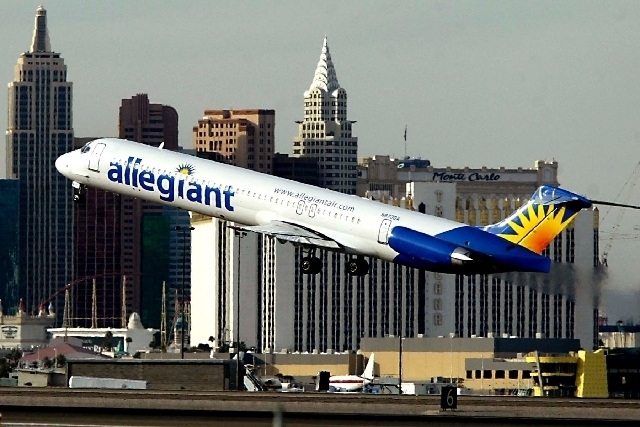Allegiant Air escapes punishment for emergency landing in Fargo
The Federal Aviation Administration has scolded but not punished Allegiant Air over a July incident in which pilots made an emergency landing in Fargo, N.D., because their plane had less fuel than required.
The airline's pilot union immediately called attention to the matter and questioned the airline's safety.
The FAA in early December issued a "letter of correction," which does not constitute a legal enforcement action, to the Las Vegas-based company. Officials say the airline was not punished because Allegiant reacted quickly to fixing the problems.
The action stems from a July 23 incident in which Allegiant Flight 426, with 144 passengers and six crewmembers aboard, was approaching the Fargo airport and pilots discovered it had been closed for a military airshow rehearsal. The flight had originated in Las Vegas and left McCarran International Airport about an hour late because of a passenger medical emergency.
By the time the plane arrived in Fargo, crewmembers said they had to dip into their 45 minutes of reserve fuel. The pilots, Allegiant executives Greg Baden and Michael Wuerger, declared an emergency and the plane, a twin-engine MD-80 jet, landed without incident.
Aviation experts have said passengers were never in danger, but the incident caused widespread embarrassment to the company.
The agency that regulates airlines and the nation's airspace criticized Allegiant for not paying attention to daily "Notices to Airmen," which had informed pilots and dispatchers of the Fargo airport closure months earlier and was repeated daily.
The FAA also said the trip's flight plan did not appear to show the plane would have adequate fuel for the trip.
But the agency also said Allegiant, after investigating the incident, instituted several improvements aimed at ensuring the carrier's dispatch personnel are aware of all potential airspace restrictions. Additionally, Allegiant will add the specific Fargo flight scenario to initial and recurrent dispatch classes.
The FAA also requested that Allegiant revise its manual system to include procedures and training curriculum for both pilots and dispatchers to help prevent such an incident from occurring again.
The FAA sent its initial letter of correction in October and issued a follow-up letter earlier this month.
Teamsters Local 1224, which represents the airline's pilots and has been working with Allegiant management to draft the airline's first union contract, criticized the company.
"Pilots have been raising concerns about how Allegiant's bare minimum approach has led to a high rate of emergency landings and diversions, and nowhere is this more apparent than the incident in Fargo," said Teamsters president Daniel Wells in a statement.
"As captains, we have a responsibility to ensure the safety of our passengers, but Allegiant executives Greg Baden and Michael Wuerger chose to put their passengers in a dangerous situation that was entirely avoidable. It's encouraging to see the FAA confirm exactly what pilots have been saying."
Baden, Allegiant's vice president of operations, oversaw the dismissal of former Allegiant pilot Jason Kinzer, who was fired after he evacuated a plane in Clearwater, Fla., following reports of smoke in the cabin. Passengers were injured in the evacuation that the company deemed was unnecessary.
Kinzer, with the assistance of the union, filed a wrongful termination suit in Clark County District Court in November.
Follow @RickVelotta on Twitter. Contact reporter Richard N. Velotta at rvelotta@reviewjournal.com or 702-477-3893.

















